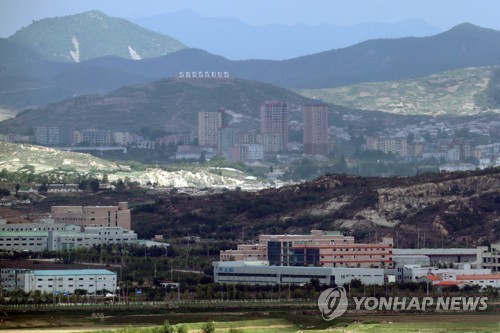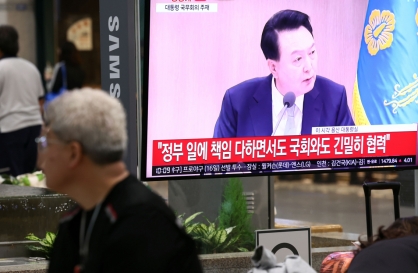S. Korean businessmen pushing to visit N. Korea after PyeongChang Olympics
By YonhapPublished : Jan. 24, 2018 - 18:08
South Korean businessmen are pushing for a trip to North Korea around the end of next month to inspect their facilities at the now-shuttered joint factory park in the North's border city of Kaesong, the head of a private task force said Wednesday.
Shin Han-yong, the head of a task force that speaks for all 123 South Korean firms that operated factories in Kaesong, said they will seek government approval for a trip between the end of the PyeongChang Winter Games on Feb. 25 and the beginning of the Paralympics on March 9.
South Korea abruptly pulled the plug on the industrial enclave -- once hailed as a key symbol of economic cooperation between the two Koreas -- in February 2016 to punish the North for its fourth nuclear test and long-range rocket launch.

"The primary goal of our visit is to inspect the equipment left in the North, but we also hope it will be a chance to resume operations at the complex," Shin said in a press conference in western Seoul.
The businessmen have asked for approval to visit North Korea multiple times, though their plans have been rejected amid tensions over Pyongyang's nuclear and missile programs.
Any trip by South Koreans to North Korea requires the Seoul government's approval as well as the North's consent. The two Koreas technically remain in a state of war since the 1950-53 Korean War ended in a truce, not a peace treaty.
It remains unclear whether a possible trip to Kaesong could generate enough momentum to reopen the factory park.
The international community has stepped up sanctions to cut off sources of hard currency for Pyongyang. UN sanctions ban transfers of bulk cash to the North.
The US has said it supports South Korea's decision to shut down the Kaesong complex in 2016.
The South Korean firms, which produced mostly labor-intensive goods like clothes and utensils at the complex, claimed that the shutdown cost them more than 1.5 trillion won ($1.4 billion) in losses.
The South Korean government estimates their losses to be around 786 billion won. (Yonhap)







![[From the Scene] Monks, Buddhists hail return of remains of Buddhas](http://res.heraldm.com/phpwas/restmb_idxmake.php?idx=644&simg=/content/image/2024/04/19/20240419050617_0.jpg&u=20240419175937)








![[From the Scene] Monks, Buddhists hail return of remains of Buddhas](http://res.heraldm.com/phpwas/restmb_idxmake.php?idx=652&simg=/content/image/2024/04/19/20240419050617_0.jpg&u=20240419175937)

![[KH Explains] Hyundai's full hybrid edge to pay off amid slow transition to pure EVs](http://res.heraldm.com/phpwas/restmb_idxmake.php?idx=652&simg=/content/image/2024/04/18/20240418050645_0.jpg&u=20240419100350)

![[Today’s K-pop] Illit drops debut single remix](http://res.heraldm.com/phpwas/restmb_idxmake.php?idx=642&simg=/content/image/2024/04/19/20240419050612_0.jpg&u=)